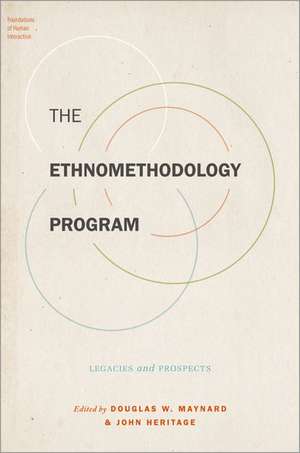The Ethnomethodology Program: Legacies and Prospects: Foundations of Human Interaction
Editat de Douglas W. Maynard, John Heritageen Limba Engleză Paperback – 21 noi 2022
Din seria Foundations of Human Interaction
- 23%
 Preț: 704.69 lei
Preț: 704.69 lei - 25%
 Preț: 509.52 lei
Preț: 509.52 lei - 6%
 Preț: 229.37 lei
Preț: 229.37 lei - 12%
 Preț: 498.99 lei
Preț: 498.99 lei - 30%
 Preț: 612.64 lei
Preț: 612.64 lei - 30%
 Preț: 551.68 lei
Preț: 551.68 lei - 26%
 Preț: 613.05 lei
Preț: 613.05 lei - 13%
 Preț: 342.88 lei
Preț: 342.88 lei - 25%
 Preț: 592.17 lei
Preț: 592.17 lei - 22%
 Preț: 344.98 lei
Preț: 344.98 lei - 30%
 Preț: 551.25 lei
Preț: 551.25 lei - 30%
 Preț: 761.21 lei
Preț: 761.21 lei - 50%
 Preț: 575.16 lei
Preț: 575.16 lei - 12%
 Preț: 313.27 lei
Preț: 313.27 lei - 13%
 Preț: 338.03 lei
Preț: 338.03 lei - 25%
 Preț: 537.81 lei
Preț: 537.81 lei - 13%
 Preț: 513.60 lei
Preț: 513.60 lei
Preț: 299.68 lei
Preț vechi: 341.46 lei
-12% Nou
Puncte Express: 450
Preț estimativ în valută:
57.36€ • 62.33$ • 48.22£
57.36€ • 62.33$ • 48.22£
Carte disponibilă
Livrare economică 20-26 martie
Livrare express 15-21 martie pentru 86.13 lei
Preluare comenzi: 021 569.72.76
Specificații
ISBN-13: 9780190854416
ISBN-10: 0190854413
Pagini: 528
Dimensiuni: 235 x 154 x 31 mm
Greutate: 0.76 kg
Editura: Oxford University Press
Colecția OUP USA
Seria Foundations of Human Interaction
Locul publicării:New York, United States
ISBN-10: 0190854413
Pagini: 528
Dimensiuni: 235 x 154 x 31 mm
Greutate: 0.76 kg
Editura: Oxford University Press
Colecția OUP USA
Seria Foundations of Human Interaction
Locul publicării:New York, United States
Notă biografică
Douglas W. Maynard is the Maureen T. Hallinan Professor of Sociology, Emeritus at the University of Wisconsin-Madison. He is author or editor of numerous books, including Bad News, Good News: Conversational Order in Everyday Talk and Clinical Settings. He has published not only in the ethnomethodological and conversation analytic literature, but also has conducted EMCA research in domains ranging from medical sociology to survey research. His research has been supported by the NIH, the National Cancer Institution, and the National Science Foundation. John Heritage is Distinguished Professor of Sociology, Emeritus at the University of California, Los Angeles. His research focuses on the sphere of social organization that Erving Goffman calls the "interaction order" and includes studies of epistemics and other topics in action formation and sequence organization in ordinary interaction, the study of political speeches, news interviews and presidential news conferences, anddoctor-patient interaction in a wide variety of practice settings.
